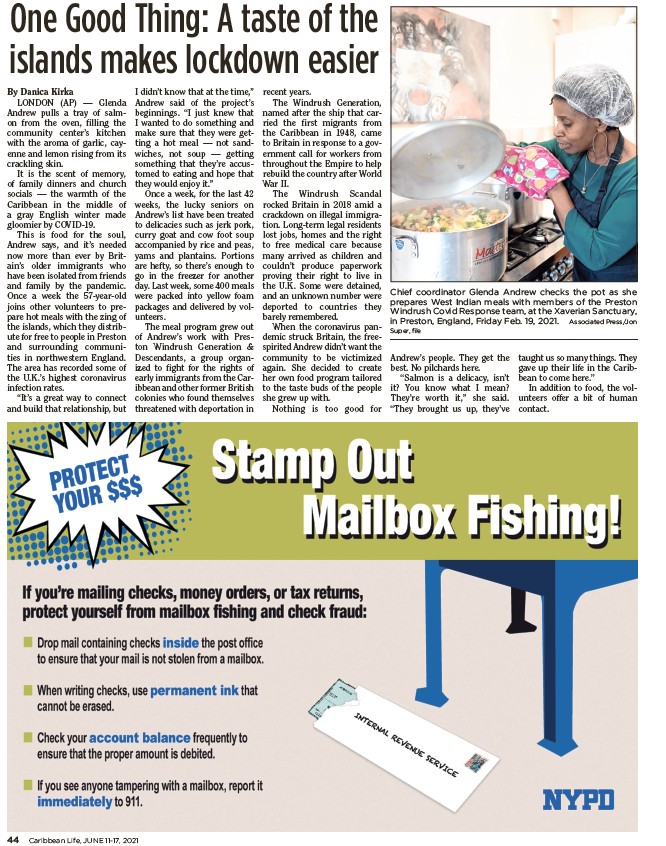
By Danica Kirka
LONDON (AP) — Glenda
Andrew pulls a tray of salmon
from the oven, filling the
community center’s kitchen
with the aroma of garlic, cayenne
and lemon rising from its
crackling skin.
It is the scent of memory,
of family dinners and church
socials — the warmth of the
Caribbean in the middle of
a gray English winter made
gloomier by COVID-19.
This is food for the soul,
Andrew says, and it’s needed
now more than ever by Britain’s
older immigrants who
have been isolated from friends
and family by the pandemic.
Once a week the 57-year-old
joins other volunteers to prepare
hot meals with the zing of
the islands, which they distribute
for free to people in Preston
and surrounding communities
in northwestern England.
The area has recorded some of
the U.K.’s highest coronavirus
infection rates.
“It’s a great way to connect
and build that relationship, but
I didn’t know that at the time,”
Andrew said of the project’s
beginnings. “I just knew that
I wanted to do something and
make sure that they were getting
Caribbean L 44 ife, JUNE 11-17, 2021
a hot meal — not sandwiches,
not soup — getting
something that they’re accustomed
to eating and hope that
they would enjoy it.”
Once a week, for the last 42
weeks, the lucky seniors on
Andrew’s list have been treated
to delicacies such as jerk pork,
curry goat and cow foot soup
accompanied by rice and peas,
yams and plantains. Portions
are hefty, so there’s enough to
go in the freezer for another
day. Last week, some 400 meals
were packed into yellow foam
packages and delivered by volunteers.
The meal program grew out
of Andrew’s work with Preston
Windrush Generation &
Descendants, a group organized
to fight for the rights of
early immigrants from the Caribbean
and other former British
colonies who found themselves
threatened with deportation in
recent years.
The Windrush Generation,
named after the ship that carried
the first migrants from
the Caribbean in 1948, came
to Britain in response to a government
call for workers from
throughout the Empire to help
rebuild the country after World
War II.
The Windrush Scandal
rocked Britain in 2018 amid a
crackdown on illegal immigration.
Long-term legal residents
lost jobs, homes and the right
to free medical care because
many arrived as children and
couldn’t produce paperwork
proving their right to live in
the U.K. Some were detained,
and an unknown number were
deported to countries they
barely remembered.
When the coronavirus pandemic
struck Britain, the freespirited
Andrew didn’t want the
community to be victimized
again. She decided to create
her own food program tailored
to the taste buds of the people
she grew up with.
Nothing is too good for
Chief coordinator Glenda Andrew checks the pot as she
prepares West Indian meals with members of the Preston
Windrush Covid Response team, at the Xaverian Sanctuary,
in Preston, England, Friday Feb. 19, 2021. Associated Press/Jon
Super, fi le
Andrew’s people. They get the
best. No pilchards here.
“Salmon is a delicacy, isn’t
it? You know what I mean?
They’re worth it,” she said.
“They brought us up, they’ve
taught us so many things. They
gave up their life in the Caribbean
to come here.”
In addition to food, the volunteers
offer a bit of human
contact.
One Good Thing: A taste of the
islands makes lockdown easier